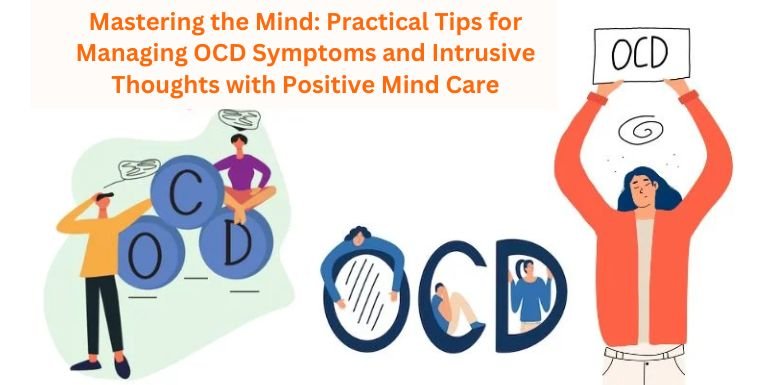Obsessive-Compulsive Disorder (OCD) can present significant challenges, but with the right strategies and support, individuals can learn to manage symptoms and regain control over their lives. Positive Mind Care is dedicated to providing practical guidance and compassionate care for individuals struggling with OCD, empowering them to navigate their symptoms with resilience and confidence. In this blog, we’ll explore practical tips for managing OCD symptoms and intrusive thoughts, guided by the expertise and comprehensive approach of Positive Mind Care.
Understanding OCD Symptoms and Intrusive Thoughts:
OCD is characterized by recurrent, unwanted thoughts (obsessions) and repetitive behaviors or mental acts (compulsions) that individuals feel driven to perform in response to their obsessions. Common OCD symptoms and intrusive thoughts include:
Contamination Obsessions: Fear of germs, dirt, or contamination, leading to compulsive cleaning, handwashing, or avoidance of certain objects or environments.
Checking Obsessions: Fear of harm or mistakes, leading to compulsive checking of locks, appliances, or personal belongings to prevent accidents or disasters.
Symmetry and Orderliness Obsessions: Preoccupation with symmetry, exactness, or orderliness, resulting in repetitive arranging, counting, or aligning of objects.
Intrusive Thoughts: Disturbing or unwanted thoughts or images, such as violent, sexual, or blasphemous thoughts, that cause significant distress and anxiety.
Practical Tips for Managing OCD Symptoms:
Positive Mind Care offers the following practical tips for managing OCD symptoms and intrusive thoughts:
Challenge Negative Thoughts: Practice identifying and challenging irrational or exaggerated thoughts associated with OCD. Use evidence-based techniques such as cognitive restructuring to replace distorted beliefs with more rational and balanced perspectives.
Practice Exposure and Response Prevention (ERP): Gradually expose yourself to feared situations or triggers without engaging in compulsive rituals. Start with less distressing exposures and gradually work your way up to more challenging scenarios, with the guidance of a therapist from Positive Mind Care.
Set Realistic Goals: Break tasks down into smaller, manageable steps and set realistic goals for yourself. Focus on progress rather than perfection, and celebrate your achievements along the way.
Develop Coping Strategies: Learn and practice relaxation techniques, such as deep breathing, progressive muscle relaxation, or mindfulness meditation, to help reduce anxiety and stress associated with OCD symptoms.
Establish Healthy Routines: Maintain a balanced lifestyle with regular sleep, exercise, nutrition, and self-care practices. Establishing healthy routines can help stabilize mood, reduce stress, and improve overall well-being.
Seek Support: Reach out to supportive friends, family members, or a therapist from Positive Mind Care for encouragement, guidance, and validation. Connecting with others who understand your experience can provide valuable support and perspective.
Conclusion:
Managing OCD symptoms and intrusive thoughts can be challenging, but with patience, persistence, and support, individuals can learn to cope effectively and lead fulfilling lives. Positive Mind Care is committed to providing practical guidance and compassionate care for individuals struggling with OCD, empowering them to overcome obstacles and thrive. If you or someone you know is struggling with OCD, consider reaching out to Positive Mind Care for personalized support and guidance on the journey towards healing and recovery.



